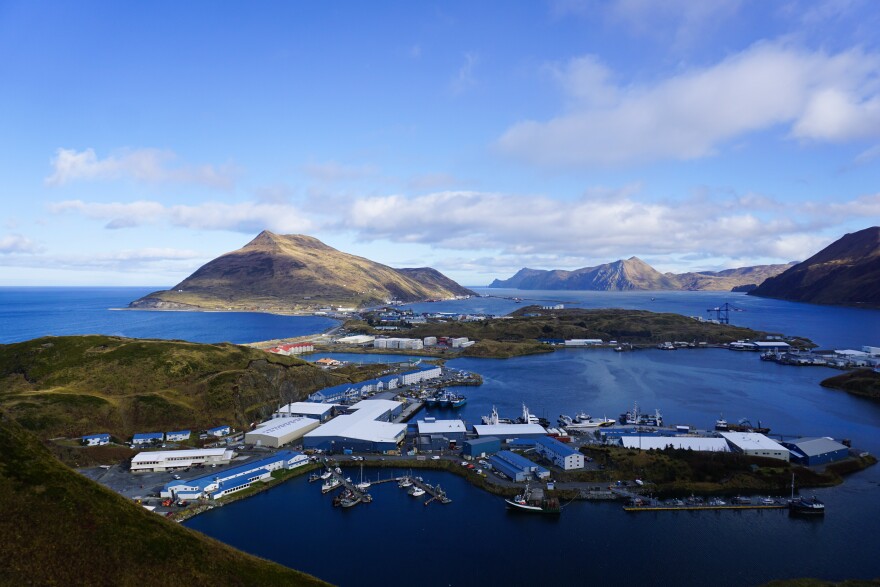More people in Unalaska are getting sick and testing positive for COVID-19 than ever before.
On Monday, the island recorded its highest number of community-acquired cases of COVID-19 since the pandemic started. And according to Iliuliuk Family and Health Services clinic CEO Melanee Tiura, an increasing number of those people testing positive have symptoms.
“People are sick. That's very concerning to me,” Tiura said. “We've had other upticks in the past where our patients have done really well — our community has done really well — but at this point, we are definitely seeing more symptoms and more illness than we had in the past.”
The city reported a total of 27 community-acquired cases on its new COVID database as of Monday. Those cases are part of an uptick the city was expecting when it saw a spike of the virus in the island’s wastewater earlier this month.
Still, Tiura said, people should be taking these numbers seriously — especially as infections spike across the state, and Alaska reports a record-high number of people hospitalized with the virus, straining hospital capacity.
“We're seeing frightening things,” she said. “We have experienced ourselves, attempting to transfer patients for COVID and non-COVID reasons, where hospitals that we normally would transfer to have been on ‘divert,’ meaning we need to pursue admissions at a different hospital. So that's alarming to us.”
Tiura said part of the reason for the rise in cases and sickness is the delta variant, which is about twice as contagious as earlier forms of the coronavirus, according to the Centers for Disease Control and Prevention.
One of the most effective ways to fight the virus right now is getting a vaccine, Tiura said.
“We have definitely seen patients who have been immunized having far fewer symptoms, less severe symptoms,” she said. “And statistically, the hospitalization rate for patients who have been vaccinated, who do get COVID — particularly the delta variant — they're not getting hospitalized, they're not getting that sick.”
The IFHS clinic is also now administering a third dose of COVID-19 vaccine to people who are immunocompromised.
The state health department suggests that anyone who is moderately to severely immunocompromised get a third shot. That includes people who have received an organ or stem cell transplant and are taking medicine to suppress their immune system, people with untreated or advanced HIV and those with moderate or severe primary immunodeficiencies.
Tiura said the number of people who are eligible for the third dose is small, especially in Unalaska, so they haven’t administered many doses yet.
The clinic has also been giving antibody treatment — known as monoclonal antibodies — for patients who have tested positive for the virus and are showing symptoms.
“We have been able to administer monoclonal antibodies, which is a treatment for symptomatic COVID patients that helps to reduce their symptoms very quickly,” Tiura said. “And it helps them to avoid hospitalization by about 70%.”
The Food and Drug Administration has authorized emergency use of a number of monoclonal antibodies for treatment of COVID-19. According to Tiura, the clinic has been treating patients with the antibodies for a few weeks.
Tiura said IFHS is also preparing for a federally-approved booster shot for anyone who wants it, not just immunocompromised people. She said when those become available, there will likely be large vaccination clinics for the community — similar to those the clinic, Eastern Aleutian Tribes and Aleutian Pribilof Islands Association facilitated earlier in the year.
IFHS and APIA are still administering first doses of the vaccine as well.
While Tiura said the increase in cases is cause for concern, people can help curb the spread by following local public health mandates and being cautious about social interactions.
She added that the possible COVID-19 booster and new antibody therapies mean more tools to address patients’ challenges and symptoms.
“We feel good about where we're at,” Tiura said. “But the trajectory isn’t looking good.”
The City of Unalaska is currently at the high COVID risk level and masks are required in indoor public spaces.
To schedule an appointment to get the third vaccine or to see if you are eligible, call the clinic at 581-1202.



